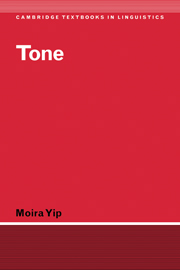Book contents
- Frontmatter
- Dedication
- Contents
- List of figures
- List of maps
- Preface
- Acknowledgements
- Notation systems, symbols and abbreviations
- Glossary of terms and abbreviations
- Alphabetical list of OT constraints
- Maps
- 1 Introduction
- 2 Contrastive tone
- 3 Tonal features
- 4 The autosegmental nature of tone, and its analysis in Optimality Theory
- 5 Tone in morphology and in syntax
- 6 African languages
- 7 Asian and Pacific languages
- 8 The Americas
- 9 Tone, stress, accent, and intonation
- 10 Perception and acquisition of tone
- Bibliography
- Author index
- Subject index
2 - Contrastive tone
Published online by Cambridge University Press: 05 June 2012
- Frontmatter
- Dedication
- Contents
- List of figures
- List of maps
- Preface
- Acknowledgements
- Notation systems, symbols and abbreviations
- Glossary of terms and abbreviations
- Alphabetical list of OT constraints
- Maps
- 1 Introduction
- 2 Contrastive tone
- 3 Tonal features
- 4 The autosegmental nature of tone, and its analysis in Optimality Theory
- 5 Tone in morphology and in syntax
- 6 African languages
- 7 Asian and Pacific languages
- 8 The Americas
- 9 Tone, stress, accent, and intonation
- 10 Perception and acquisition of tone
- Bibliography
- Author index
- Subject index
Summary
The goal of this chapter is a descriptive summary of the types of tones and tonal inventories found around the world. It begins with a discussion of notational and fieldwork issues, then moves on to consider level tones and contour tones, the interaction of tone with segmental phenomena, and the origins of tonal systems (tonogenesis). It lays the groundwork for the following chapter, in which I will develop a theory of distinctive features for the analysis of tonal systems.
Which languages are tonal?
Although those of us whose first language is English think of tone as exotic, it is in fact extremely widespread. At a very rough estimate as many as 60–70 per cent of the world's languages may be tonal. Three areas of the world have so many tone languages that I have given them a chapter each later in this book: Africa (chapter six), East and South-East Asia and the Pacific (chapter seven), and the Americas (chapter eight). In parts of these areas (such as Meso-America), tonal languages are so common that they can almost be considered the norm. The vast majority of the world's tone languages are found in these areas. Conversely, there are parts of the world where tone languages are rare or perhaps non-existent, most notably Australia and New Zealand. Many other parts of the world show a more mixed picture. Let me go into a little more detail. In what follows, bear in mind that, as explained in chapter one, languages termed ‘accentual’ are often analysed as a sub-type of tone language having a small number of sparsely distributed tones.
- Type
- Chapter
- Information
- Tone , pp. 17 - 38Publisher: Cambridge University PressPrint publication year: 2002
- 2
- Cited by



